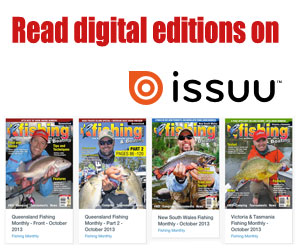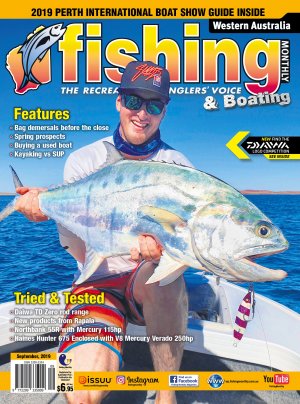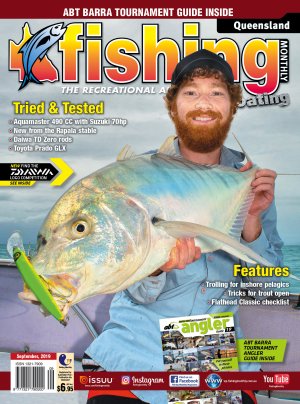We are now in the depths of Winter and for many native fish anglers, that means the rods are put away until Spring. For others, it is time to put in a bit of sneaky fishing at a time when there are still fish to be had but less competition from other anglers.
But to catch fish during the coldest time of the year it pays to know as much as possible about your fish and their habitat.
Native fish are notorious for their lack of activity during cold weather and because of this it is hard to fathom precisely what they do get up to during Winter. I've gained a few clues over the years by observing fish in the wild, as much as that is possible, but perhaps more usefully by watching tame fish I keep in a large indoor tank.
Over the years I have noticed a reasonably close correlation between behaviour of fish in the tank and reports from anglers of fish behaviour in the wild. The fish included silver perch, golden perch, catfish and Murray cod.
For example on hot, humid days when the barometric pressure is rising or already high, fish commonly are active from early morning until late at night.
They swim around the tank a lot, feed avidly and take in large amounts of food, including dead saltwater prawns, scrub worms and live yabbies.
They are strongly competitive, often jostling each other for food or for a desired position in the tank. They appear acutely aware of goings on outside the tank, watching and responding to people passing by or other activity.
When the temperature drops or the barometer falls, the difference in their behaviour is quite marked. They don't move around as much, jostle for position less actively and eat less. They lack responsiveness to activity inside and outside the tank.
Activity varies between species. Silver perch, for example, never really seem to settle down.
They always appear nervous and never seem to fully adjust to the tank environment. They are easily bullied by other fish and easily frightened by activity in or adjacent to the tank. They will eat dead food if really hungry but show a distinct preference for live food, especially worms.
Golden perch easily adapt to a tank environment. They eat prawns, yabbies and worms with gusto and adore live fish such as small carp, goldfish or weather loaches.
Watching them eat live yabbies is interesting. Small ones simply go down the hatch with a strong sucking motion.
If the yabby is picked up off the bottom, the fish commonly sucks in a fair amount of gravel at the same time, which is expelled with a forceful whoosh.
Larger yabbies are treated quite differently and there are some lessons for anglers to learn from watching this activity.
If the perch is really hungry it simply advances on the yabby, then sucks it down the hatch head first or tail first, but commonly the fish manoeuvres the yabby in its throat to point tail first.
If the yabby is really large, the fish might stick it partially out of its mouth and then bash it against a rock or log to break it up before swallowing.
Sometimes you can see the fish hiccuping and bucking, obviously being bitten by the yabby as it goes down the throat.
Sometimes when this happens the fish spits out the yabby and retreats to a corner, obviously upset. It may then reconsider and swallow the yabby again or just leave it alone.
Sometimes, after a fish has swallowed a big yabby it spits out the claws. Think how often you have been walking a river bank and noticed two yabby claws just sitting there in the water? Presumably that's a sure sign of a fish in residence right there and thus a good place to fish.
Amazing what you can learn from watching fish behaviour in a tank!
A determined yabby can sometimes keep a large golden perch at bay for a surprisingly long time, either by nipping the fish with or menacing it by waving the nippers.
If the perch is really hungry it may just ignore the threat and swallow the critter alive but sometimes the threat works and the fish moves off, looking for tucker that doesn't bite back.
Golden perch in a tank can also be quite territorial at times. I have one that likes one end of the tank and whenever the big catfish in the same tank invades that space, it gets belted. Sometimes the cattie just won't retreat and head-butts and slobbers on the golden until it goes away and sulks.
When a golden is full, however, you can drop as much food as you like in front of it and it will not touch it – except for a small yabby. That's the one thing that even the most food-filled fish is still likely to take.
So use smaller rather than larger yabbies for bait and increase your chance of a fish taking it. Experienced fishers of course, already know this but it is interesting to see it proven in a tank.
Catfish are surprisingly durable fish to bring home from the wild. They travel easily and recover well from the stresses of capture and transport.
They like soft food such as worms or dead prawns and only rarely tackle a small yabby and never a large one.
Cats are mostly quite patient about being bullied by golden perch or Murray cod but when affronted, they can hit back with surprising vigour, gumming and head-butting even the biggest opponent.
They eat a lot of food for their size but spend a large part of their day sleeping on the bottom or curled around a log. They have an acute sense of smell and can detect a prawn chucked into the tank within seconds, even from a distance.
Murray cod are real brawlers in a tank. They select a location, usually under a log or rock, and make that their territory.
They own it and control it and beat the hell out of an anything else that strays into it. That's unless they eat it first.
And they can eat some remarkable-sized objects. I had one that ate another cod, a Macquarie perch, a silver perch, a redfin and a tortoise, all of which were quite large. In desperation, I finally threw the cod back into Lake Ginninderra where it had originated.
Cod have no finesse when they eat. They simply swim up to the prey, open their mouth and wolf it down.
Golden perch suck in their prey; cod gulp it.
Cod often swallow their fish prey head first but yabbies may be swallowed head first, tail first, sideways – any way. They simply go down the hatch with a bit of heavy swallowing and gulping.
Cod don't seem to mind the claws, although occasionally they will do what goldens do and spit out the claws.
So what do the tank fish do in Winter? Mostly they sleep.
They simply lie on the bottom, their eyes open but slightly glazed, and do nothing.
Sometimes late in the afternoon they will stir briefly, do a short lap of the tank, then go back to sleep.
They eat only occasionally, and only if the food is placed near them. They eat only a small amount and nearly always late in the day.
From this you might deduce a few clues to fishing in the wild in Winter.
Perhaps it means fishing late in the day, using soft baits for catfish and silver perch, small yabbies with claws removed for golden perch and small or large for Murray cod.
Fish on the bottom in deeper, rather than shallower, water and move the baits around a lot to maximise contact with the fish.
Reads: 4584
It's an interesting exercise comparing fish behaviour in a tank to that in the wild, but it can be productive.
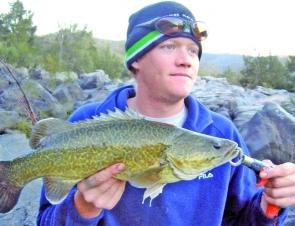
Murray cod are territorial brawlers in a fish tank, fiercely defending their chosen space.
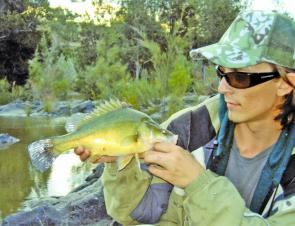
Golden perch can be surprisingly easily bluffed by a nipper-waving yabby unless they are really hungry. Remove the claws for best results.

